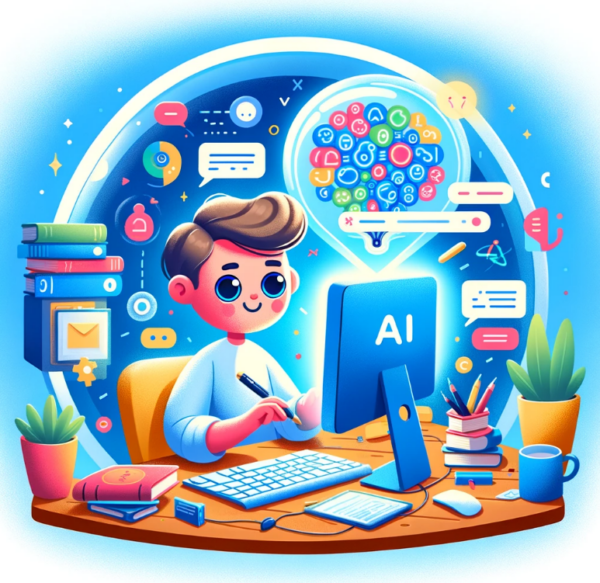If there’s one thing the rise of digital technology has taught us, it’s that even books can speak—literally. The audiobook market has exploded in recent years, turning long commutes, mundane chores, and late-night insomnia into prime audiobook listening time. Traditionally, human narrators have been the gold standard for audiobook publishing, but there’s a new player on the scene: artificial intelligence (AI). In this article we’ll find out more about AI narration in audiobooks.
Imagine no longer having to worry about your narrator catching a cold before a recording session or needing to redo a dozen takes to get that one line just right. AI audiobook narration provides a faster, cost-effective, and natural-sounding solution. This technology enables authors to easily convert their ebooks into audiobooks using AI-generated voices, providing high-quality sound without the costs and time associated with human narrators. But is it the right choice for every author? Let’s dive into how AI narration is transforming the audiobook landscape and what it means for authors looking to expand their audience.
The Evolution of Audiobook Narration
Audiobooks have come a long way from their beginnings on cassette tapes (yes, the ‘80s were wild). Initially, professional voice actors were the only option for narrating books within the audiobook industry. These talented individuals brought stories to life, adding drama, humor, and sometimes accents that may or may not have been necessary. But now, AI technology has emerged, promising speed, consistency, and a little less drama (at least from the narrator). AI-narrated audiobooks are becoming more common as AI technology advances, revolutionizing audiobook production for independent authors and publishers.
What is AI Narration?
AI narration uses advanced text-to-speech technology to convert written text into spoken words. These voices are synthesized, meaning they are generated by computers, not humans. While this might sound a bit robotic, AI technology has advanced to the point where these voices can sound incredibly natural. With the ability to mimic various tones, pitches, and styles, AI narration opens new doors for authors who want to produce audiobooks without breaking the bank.
How AI Narration Works
The magic of AI narration lies in sophisticated algorithms that convert text to speech. The process starts with text-to-speech technology, where a digital voice reads the content aloud. But it’s not just about reading; it’s about delivering the right intonation, pacing, and even pauses for effect—no awkward silences allowed. Advanced options let authors choose different voices, and accents, and even tweak pronunciations, ensuring the final product is polished and engaging.
Your Publishing Journey Awaits – Start NowAI Narration in Audiobooks: Pros and Cons of AI vs. Human Narrators
AI narration offers several significant advantages. It’s cost-effective, faster to produce, and can be easily scaled. Plus, with AI, you can choose from a variety of voices that never tire or need a coffee break. Need a British accent? No problem. Want a cheerful, upbeat tone? Done. However, AI narration can sometimes lack the emotional nuance that a human brings— AI cannot currently deliver that dramatic pause before a plot twist with the same finesse as a seasoned narrator. On the other hand, human narration brings authenticity, flexibility, and a deeper understanding of complex emotions, but at a higher cost and longer production time.
Qualities of a Good AI Voice
Not all AI voices are created equal. A good AI voice should possess several key qualities to ensure a high-quality listening experience. First and foremost, it should have a natural-sounding tone and pitch, making it easy on the ears and indistinguishable from a human voice. Clear enunciation is crucial; no one wants to strain to understand muffled or unclear words.
Emotional expression is another vital quality. A good AI voice should be able to convey emotions and tone accurately, adding depth and nuance to the narration. This can make a significant difference in how engaging and immersive the audiobook feels. Consistency is key—the AI voice should maintain a steady tone, pitch, and volume throughout the entire audiobook, avoiding any jarring changes that could disrupt the listener’s experience.
Lastly, adaptability is essential. A versatile AI voice can adjust to different genres, styles, and contexts, delivering a unique and engaging listening experience every time. Whether it’s a thrilling mystery or a heartfelt romance, a good AI voice should be able to handle it all with finesse.
Creating an Audiobook with AI
Thanks to the straightforward process and user-friendly tools available today, creating an audiobook with AI is a breeze. Here’s a step-by-step guide to get you started:
- Select an AI voice platform: Start by selecting a reputable AI voice platform that offers high-quality voices and intuitive tools. Platforms like Google Play Books and Apple Books Digital Narration are excellent choices.
- Upload your manuscript: Once you’ve chosen your platform, upload your manuscript. You can either copy and paste the text or import a file directly.
- Select a digital voice: Next, choose a digital voice that matches the tone and mood of your book. Whether you need a calm and authoritative voice or an upbeat and cheerful one, there’s a digital voice out there that will resonate with your target audience.
- Edit and fine-tune the narration: After selecting your voice, it’s time to edit and fine-tune the AI narration. Make sure it meets your quality standards by adjusting the tone, pitch, and pacing as needed.
- Add music and sound effects: Enhance the listening experience with background music and sound effects. This can make your audiobook more immersive and enjoyable.
- Export and distribute: Finally, export your audiobook in the desired format and distribute it to online retailers like Apple Books, Google Play Books, and Audible. And just like that, your audiobook is ready for distribution!
AI Voice Platforms and Tools
Several AI voice platforms and tools are available that can help you create high-quality audiobooks with ease. Here are some popular options:
- Google Play Books: This platform offers a range of digital voices and easy-to-use tools for creating audiobooks. It’s an excellent option for authors interested in AI narration.
- Apple Books Digital Narration: Utilizing advanced speech synthesis technology, Apple Books Digital Narration provides high-quality audiobooks that sound incredibly natural.
- AuthorVoices.ai: This platform offers a variety of AI voices and tools for creating audiobooks, including the unique ability to clone your voice, allowing authors to add a personal touch to their narration.
- Speechify Voice Over: With a range of digital voices and user-friendly tools, Speechify Voice Over makes it simple to create professional-sounding audiobooks.
- Murf.ai: Known for its high-quality digital voices and intuitive tools, Murf.ai is another excellent option for authors looking to leverage AI technology in their audiobook production.
AI Narration: Cost-Effective and Scalable Solution for Authors
One of the biggest advantages of AI narration is its affordability. Hiring a professional narrator is often costly, especially for longer books. AI audiobook narration enables independent authors to produce high-quality audiobooks without needing a Hollywood budget. Plus, if you’re in a rush to get your book to market, AI narration can speed up the process, allowing you to release your audiobook alongside your print or eBook versions.
Real-World Examples of AI-Narration
Several major platforms are already using AI narration, including Apple Books and Google Play Books. Companies like Findaway Voices offer tools that make it easy for authors to experiment with AI narration, while platforms such as Spines integrate these tools seamlessly into their publishing services. These examples illustrate how AI narration is already a practical solution, transforming the audiobook industry.
Your Publishing Journey Awaits – Start NowChallenges of AI Narration
Despite all its benefits, AI narration does have its limitations. The technology, while impressive, is not yet perfect. Occasional mispronunciations, particularly with names or unusual terms can occur. The lack of emotional depth in certain scenes can leave listeners wanting more. While you can manually edit and fine-tune AI narrations, it still may not fully replicate the warmth and emotional depth of human narration. Human narration provides a personal touch that AI technology currently struggles to replicate, making it an essential component of a well-rounded audiobook experience.
Editing and Fine-Tuning Your Audiobook
Editing and fine-tuning your audiobook are crucial steps to ensure it meets your standards of quality. Here are some tips to help you polish your AI-narrated audiobook:
- Listen to the entire audiobook: Start by listening to the entire audiobook to ensure it sounds both natural and engaging. Pay attention to the flow and overall listening experience.
- Check for errors: Look out for any errors in pronunciation, grammar, and punctuation. Correcting these will produce a more professional and enjoyable audiobook.
- Tone and pitch adjustments: Make sure the tone and pitch of the AI voice match the mood and tone of your book. Small adjustments can make a big difference in how the narration is perceived.
- Add pauses and breaks: Incorporate pauses and breaks in the narration to enhance the listening experience. This can help emphasize important points and make the audiobook more dynamic.
- Use music and sound effects: Background music and sound effects can add an extra layer of immersion to your audiobook. Use them strategically to enhance the storytelling.
Cloning Your Voice with AI
Cloning your voice with AI is a revolutionary technology that offers several benefits for audiobook production. Here’s why you might consider it:
- Personal touch: Cloning your voice adds a personal touch to your audiobook, making it more engaging and relatable for your listeners. It’s like having a conversation with the author.
- Authenticity: Cloning your voice with AI ensures authentic and genuine narration, preserving the unique nuances of your speech.
- Convenience: This technology offers a convenient way to create an audiobook without the need to hire a voice actor or spend hours recording your voice. It’s a time-saver for busy authors.
- Cost-effective: Cloning your voice is a cost-effective solution, eliminating the need for expensive recording equipment or professional voice actors. It’s a budget-friendly option for self-published authors.
By leveraging AI technology to clone your voice, you can create a unique and personal audiobook that resonates with your audience.
The Future of AI Narration in the Audiobook Market
AI technology is constantly evolving, and the future of AI narration looks promising. As developers improve the ability of digital voices to convey emotions and add more nuanced expressions, AI may soon rival human narrators in more genres, not just non-fiction or self-development titles. With advancements in machine learning, who knows? We may see AI narrators delivering those chilling thriller lines with just the right amount of suspense.
Tips for Authors Considering AI Narration
If you’re considering AI narration for your book, here are a few tips: Select a voice that aligns with the tone of your book—there are many options, from upbeat and cheerful to calm and authoritative. You can also enhance your audiobook by adding background music or sound effects, making the listening experience richer. Most importantly, listen to the finished product and make edits if needed. Remember, AI is a tool that can help bring your book to life, but a bit of human touch (in the editing) can go a long way.
Is AI Narration the Right Choice for You?
AI narration opens up new possibilities for authors, making it easier and more cost-effective to create audiobooks that reach a wider audience. While it may not replace human narrators, it’s a fantastic option for authors looking to get their work out quickly and efficiently. Whether you’re a seasoned author or a first-time self-publisher, AI narration could be the tool that helps you break into the audiobook market without all the usual hassle.
Ready to bring your book to life? At Spines, we simplify the process of turning your manuscript into a professional audiobook using AI narration. Visit Spines.com to learn more and get started today!
Your Publishing Journey Awaits – Start Now







